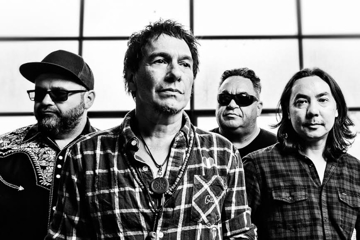Bart Willoughby and Emily Wurramara On The Sounds Of Indigenous Australia Then And Now
"Uncle Bart [and his contemporaries] have set the path for us to follow and have unrestricted those boundaries and really made an example."

Bart Willoughby (pic by Nick Harrison) + Emily Wurramara
Ahead of the 2017 National Indigenous Music Awards, the NIMAs have partnered with Festival Records and Warner Music Australia to celebrate the best of Indigenous music, both past and present, with the release of The Sound Of Indigenous Australia.
Broken into two parts, Now and Before, the compilation includes the likes of everyone from Thelma Plum, AB Original and Dan Sultan to Yothu Yindi, Christine Anu and Kev Carmody, bringing together a variety of styles and talent to showcase the best on offer from different generations of musicians.
Bart Willoughby and Emily Wurramara both feature on the album and represent the 'then and now' that the album refers to. Willoughby is known for his work in iconic groups No Fixed Address and Yothu Yindi, and Wurramara is an up-and-comer who's recently released her Black Smoke EP.
When chatting with The Music, it was apparent both are pleased to be sharing the billing; Wurramara adding that the music she creates has been directly influenced by Willoughby and his contemporaries.
Don't miss a beat with our FREE daily newsletter
"For me, being a young Indigenous up-and-coming singer-songwriter, Uncle Bart [and his contemporaries] have set the path for us to follow and have unrestricted those boundaries and really made an example. We look up to them, we see them as our inspiration and it allows us to continue on what their legacy has set."
"They start off from where we virtually left off, so to speak," says Willoughby. "It's like passing a pendulum on."
For Willoughby, it's hard to pick a favourite from the compilation, with each track and artist offering something from the next. "I just love the way people put their version down," he says. "I just love the way they create their own character because it's really, really hard to do that."
"It's just amazing to see a diversity and different age groups and genres on the CD," adds Wurramara. "Every song pretty much resonates because in a way it tells a certain journey and tells its own story."
Wurramara believes that Black Smoke and We Have Survived were chosen to represent herself and Willoughby respectively on the album because of their wide-ranging appeal.
"To be honest, I think they were chosen because they're songs that everyone can relate to, and they're songs that tell a story and have elements that represent Indigenous storytellers and how our people are living and how we were and what we're doing now. For me personally, with Black Smoke, it was a song about connecting with the souls around you and sharing the stories and sharing the love and the feeling, and sitting around the camp fire. That's what everyone does and I'm really glad that that was chosen."
When asked if there is anyone among her contemporaries that she thinks is creating particularly important work, Wurramara thinks each offer something special.
"I think we have a variety, not to pick anyone out, but everyone in their own way is sharing their journey and sharing their story and it makes them so unique and we each have our own thing that sets us out from the rest," she says.
"We're all very different from another but it's amazing to see how we're coming up and we're having no shame to talk and speak about issues that are affecting our people through music and through instruments or through storytelling or however but it's really beautiful to see that."
"What I love is the imagination of how they put the music down," says Willoughby. "That's what I'm fascinated by because then you can hear their spirit and their character.
"The young kids, they just blow me away because I think us old fellas did our job right," he continues. It's a sentiment that Wurramara agrees with, echoing "more than right".
"We write songs that make people think and come together," he finishes.







